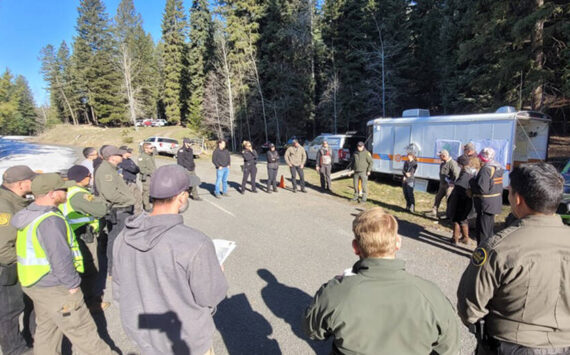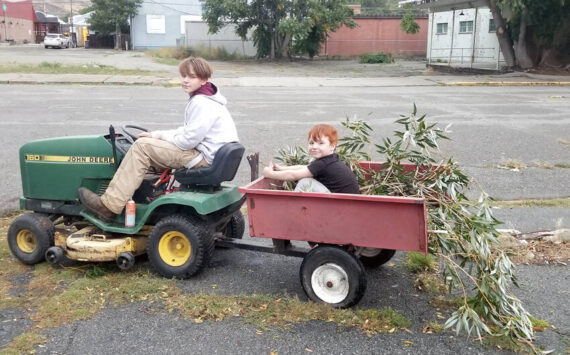OROVILLE – When Chris Branch, Oroville’s director of Community Development addressed the chamber of commerce, he said the questions he gets most recently involve transportation, tourism, trails and trees, as well as mosquitos and marijuana.
He said these, along with sewer and water, seem to be the topics most on the people of Oroville’s mind.
Branch said he serves, or has served on a number boards and committees, including the Okanogan Trails Scenic Byway committee, the Tourism Advisory Board and the Regional Transportation Planning Organization (RTPO).
The RTPO serves Chelan, Douglas and Okanogan counties. Branch said there was a move to concentrate on just Chelan and Douglas county projects.
“Members of the RTPO wanted to vote to take us out and there were huge objections, especially by Okanogan County,” said Branch.
By way of emphasis Branch said the RTPO has been important to the Scenic Byway as well as the Heavy Freight Corridor.
“Judy Lorenzo (Coordinator of Statewide Transportation Plans) took the lead with legislation on the Scenic Byway… she also helped later when we were asking for the Heavy Freight Corridor. The (Okanogan) county commissioners said ‘yes,’ we need to say in the RTPO, that regional planning is important,” said Branch.
The Heavy Freight Corridor, from the Canadian border to the railhead in Oroville, continues to be an important asset to the area’s economy, as well as the health of the Cascade and Columbia River Railway, according to Branch. The railway runs the short line from Oroville to Wenatchee and in Oroville it serves Oroville Reman and Reload, Zosel Lumber Company and the Weyerhaeuser Chip Plant.
“There has been some talk about extending the Heavy Haul Corridor to Omak. The truck traffic would double through Tonasket and some haulers might skip Oroville. Part of the argument for the corridor was this railhead in Oroville was to put freight out of Canada on the rails and make the railway viable,” said Branch. “Columbia River Carbonate (located by the Janice Bridge south of Tonasket) can’t afford to lose its connection to the railroad and run that business by truck.”
Extending the corridor would also mean that the highway between the Oroville and Omak would be more expensive to maintain because it needs to be maintained at a level to handle heavier trucks. Currently that level of maintenance is less than five miles, if it is extended it would be closer to 40.
Branch said before any decision to change the Heavy Freight Corridor is made by the state a number of issues need to be considered including the need to extend it to Omak, how it would affect the short line railway and how it would affect businesses here in town.
“When planning sometimes someone comes up with an idea without really looking at the bigger issues and whether making the change fits the bigger picture. If they downplay the railroad, the railroad could go away,” he said.
About trails, Branch said the new county commissioners have placed less emphasis on the county’s trail system.
“The commissioners seem to be backing away from trails,” he said, adding that the county’s trail system is a big generator of tourism.
“A lot of people ask about the trails at the Visitor Information Center… they are a generator of tourism and also are important to people looking for somewhere to live,” Branch said.
While the city purchased land to create a trailhead to the Similkameen Trail it turned the property over to the county when they applied for a trails development grant. Branch said there is a chance that the county may want to return the trailhead to the city.
“The PUD originally sold that property to DJ Cattle Company for $30,000 rather than coming to the city. We ended up by buying it back for $100,000 and then turned it over to the county and they developed it.
That’s why I was a little worried about regional planning. You don’t have to sell your soul for tourism, it is just one leg of the stool. If your economy goes down tourism can help.”
In discussing the state’s lodging tax, commonly referred to as the Hotel/Motel Tax, which is levied on people who rent a place to stay for less than 30 days, Branch said there have been some changes.
“The state added more requirements… there was a movement to take it away from the communities and use it elsewhere. For now people applying for the tax from the city or county have got to show how many people your event is going to bring to the community,” said Branch.
Branch explained about Oroville’s Tree Board and how they were doing an inventory of trees that fall under the city’s jurisdiction and how the board should be consulted prior to someone doing anything that would affect those trees.
He said that a plan to form a Mosquito Taxing District was in the works and that Oroville, Tonasket, Riverside, Omak and Okanogan were being asked to join. The district would impose a tax to take preventative measures and spray for mosquitos each year.
Oroville is still deciding how the new legalized marijuana law will affect the city. Decisions on where grows and stores can be located will be part of the process. He said stores that sell marijuana will probably be treated like bars and stores that sell liquor. They are limited to locations depending on their proximity to schools, churches and parks.







